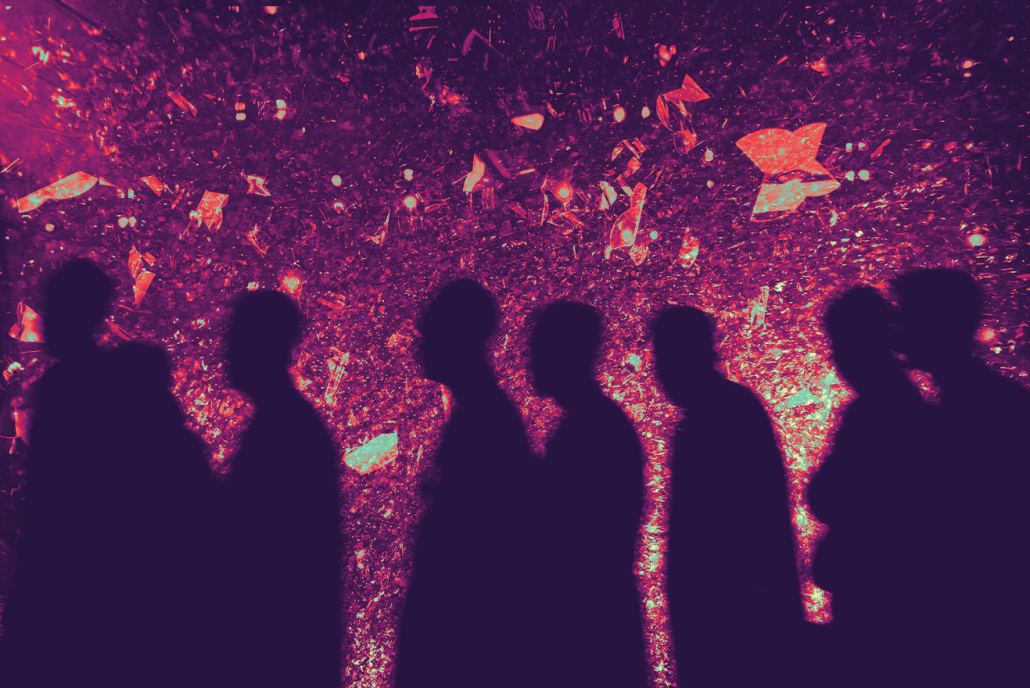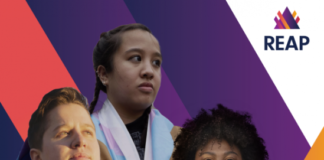
On the corner of 4th Street and Broadway, Brian Sullivan and his husband spent Friday night at Precinct, a popular gay bar in Downtown Los Angeles. It was their first night out since news of the monkeypox virus broke in the queer community.
Drawn in by familiar strobe lights pulsing to the DJ’s ‘80s disco mix, Sullivan weaved through tipsy strangers and barely audible conversations to the dance floor. He spent the last few weekends, Sullivan said, trying to find monkeypox vaccines for him and his husband.
“The local government is nowhere to be seen,” Sullivan, a USC alum and 30-year resident of South Central L.A., said. “My husband and I finally got our vaccines through Redline, another gay bar on 6th.”
At Precinct, once you’ve paid the $9 cover fee, you can also receive the monkeypox vaccine, either by appointment or walk-in, with a side of gin and tonic and front-row seat to “Fat Slut,” the bar’s newest drag show.
In a grassroots campaign to expand monkeypox resources between South L.A. and DTLA, the L.A. queer community has transformed night clubs like Precinct into one of the ways residents can access their two-dose vaccinations against the virus.
“Once again, the gay community is coming together and being there for ourselves. Where are we going to get a vaccine? Precinct, Redline, [The] Abbey,” Sullivan said. “We’re looking after our own when the government is slow to respond.”
L.A. County currently has the highest number of monkeypox cases in the state, and it reported the country’s first monkeypox death back in September, according to the Centers for Disease Control and Prevention. Of the county’s 2,364 total monkeypox cases reported as of Nov. 9, 96% are male residents and 76% are gay, lesbian or bisexual, according to the L.A. County Department of Public Health.
“One of the first reasons I wanted to get the monkeypox vaccine was because I knew L.A. goes crazy. I knew there’s going to be parties and they’re going to [have] super close contact,” said Sachin Dubey, a junior majoring in public policy. “[If] it’s ‘fuck following the COVID protocols,’ then the monkeypox protocols are not going to be followed at all.”
Dubey received their first dose of the monkeypox vaccine in Chicago at the University of Illinois Chicago, where they worked a public sector job before coming back to USC.
Dubey’s search for a second dose of the vaccine, however, has been even more of a challenge now that they are back at USC. Unlike UIC, USC does not offer monkeypox testing or vaccinations for students or residents, with the exception of a USC School of Pharmacy clinic at Dodger Stadium in Elysian Park, according to the USC monkeypox information website.
The website refers students and staff to guidance about the virus from the CDC and LAC DPH, adding that “eligible residents can walk up to receive the monkeypox vaccine at [LAC DPH] vaccination points of dispensing (PODs)” in an August 26 update.
Dubey said UIC, a public university, may have had early access to the monkeypox vaccine due to its access to government funding, and that USC may not have had a similar opportunity yet.
“But, it’s also very strange to see how stringent they were about COVID [precautions] last fall and spring,” they said, “and it literally went from a 100 to zero. There’s no effort being put into monkeypox prevention.”
To reach more eligible queer residents, clinics with federal supplies of the JYNNEOS monkeypox vaccine are partnering with queer bars, nonprofits and event organizers. St. John’s Wells Child and Family Center, a South L.A.-based network of medical clinics, partnered with gay bar Redline DTLA to distribute hundreds of second-dose monkeypox vaccines, according to a Sept. 8 press release.
Simon Kilner, the bartender at Precinct, said he received the second dose of his vaccine at the bar, whose vaccination site is run by Studio City-based Elements Pharmacy. Kilner’s experience getting the first dose, which he received at an L.A. County site, was drastically different from his follow-up shot at Precinct, he said.
“I waited in line for three and a half hours, and I frantically had to lie and cheat my way into getting the vaccine,” said Kilner. “The second time I got it at Precinct, I got it in five minutes.”
Kilner said he did not find out about the vaccine until some of his queer friends contracted the virus. He said witnessing his friends deal with monkeypox compelled him to search for a vaccine.
“It was gay men themselves finding out about it and doing what they could to make [vaccines] happen,” Kilner said. “It looked so painful and awful. I think that drove a lot of gay men to get the monkeypox vaccine.”
To veterans of queer nightlife like Sullivan, gay bars have been historical sanctuaries for the LGBTQ community. This network of mutual care, he said, is rooted in the community’s fight against the 1980s AIDS/HIV epidemic while the U.S. government neglected it.
“It was amazing to me when monkeypox started to surface, and all of a sudden, everyone was so quick to say, ‘Oh, that’s just another gay disease. Let’s not pay attention,’” Sullivan said.
“It makes me feel like we learned nothing from that first epidemic, where so many tens of thousands of people in the queer community died because of such a slow response,” he added. “In the early ‘80s, I was a teenager. Now, I’m in my late fifties. We’ve made a lot of strides. But to see another slow response to what is considered to be a ‘gay disease’ is disheartening, to say the least.”
Kilner echoed Sullivan’s concern about the stigma of a “gay disease,” noting that AIDS was incorrectly labeled this way when it first surfaced.
“And then it crossed over to the straight community, and everyone took interest in it,” Kilner said. “The same thing could happen with monkeypox. It’s prudent to to make sure it isn’t just a ‘gay thing.’”
John Blosnich, director of the Center for LGBTQ+ Health Equity at USC, said public messaging about monkeypox failed to convey the complexity of the virus, prompting some to make false equivalences between monkeypox and sexually transmitted diseases.
“People do not fully understand how [monkeypox] is transmitted. If they think it’s an STD, that inaccuracy leads them to not taking adequate precautions to protect themselves,” Blosnich said “An illness can be affecting one community disproportionately, but you can also balance that with anti-stigma messages.”
Dubey expressed concern about USC’s lack of effort to clear misconceptions about the virus. At the bare minimum, USC Student Health could guide students about prevention practices when socializing on and around campus, Dubey said.
“I still think there’s a stigma where it’s hard to differentiate between a skin-to-skin contact-spreading virus and an STI,” they said. “A public information campaign geared towards the facts would be helpful to students.”
Frequent close-contact interactions at college, whether through hook-up culture or at crowded football tailgates, make it even more of an imperative for USC to dispel the stigma of a “gay virus,” Dubey said.
Blosnich worries that a regional disparity in access to monkeypox-related resources could also disproportionately affect queer people of color and those who are low-income and live in neighborhoods lacking LGBTQ health clinics, including South Central and East L.A.
“If a community doesn’t have resources in it and has to travel to get those resources, that’s automatically a disadvantage,” Blosnich said. “Can someone who serves in West L.A. really know the context of someone living in South or East L.A.? These areas don’t really have their own homegrown resources with providers who live in their communities.”
The travel time Blosnich refers to is a 40-minute metro or car ride to the Ted Watkins Memorial Park vaccination site — the only one in South L.A., according to the L.A. County DPH. This disparity may be why South L.A. residents received just 6% of the 71,266 total vaccines administered in the county as of Nov 9.
For USC students, lack of time and transit could hinder accessibility to the vaccine.
“It’s a shame that in L.A., the closest by-transit monkeypox vaccines for me are on 103rd Street,” Dubey said. “I [have] to take the blue line all the way down to Watt, and then get off three blocks from a health center and get their vaccine.”
If USC rolls out monkeypox vaccination at any point, it has both the resources and opportunity to serve local residents in vaccine deserts, Dubey said — an approach that would diverge from the University’s coronavirus vaccine rollout.
Sullivan and his husband live across from Kedren Medical Center in South L.A. They said even if the county expanded vaccination in the area, they would be concerned about white Angelenos from the West Side coming in and taking shots away from local residents.
“For the COVID vaccines, we’d all of a sudden see all these white people coming to our neighborhood because they’re getting the vaccine. And Latinos can’t take time off from work,” Sullivan said. “It was hard to watch. I have a front row seat to this despairing difference.”
Dubey is still unsure of where they will go to receive their second dose of the monkeypox vaccine.
“If I could somehow make it into one of the bars close to campus, I would definitely do that,” they said. “I have zero experience going to these spaces.”
Dubey, who is under 21, hesitates to approach these bars since their websites and flyers don’t clarify any age restrictions for the immunization portions of their floorspace.
“But I do know that there’s a lot of queer people in our area, and they have trust factor like any minority group. We do have our own little network of people and community as a safe space,” Dubey said. “So it makes sense that the community would feel safe together building these locations where you can get the vaccine.”








